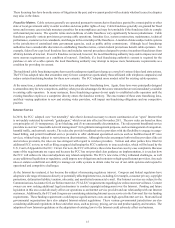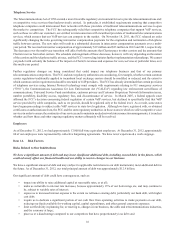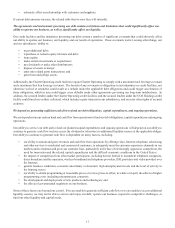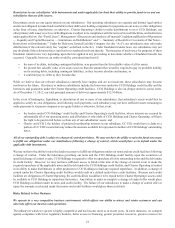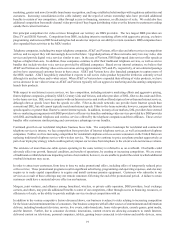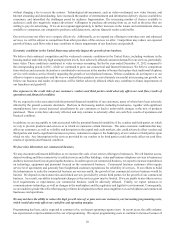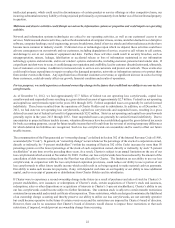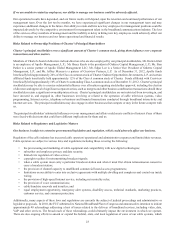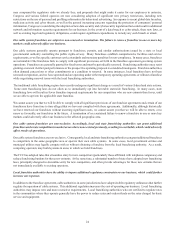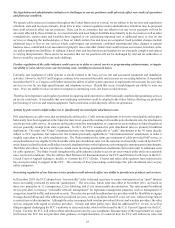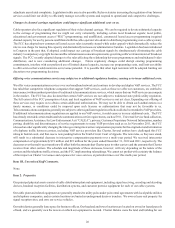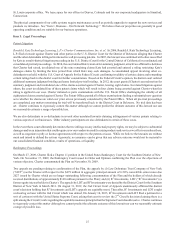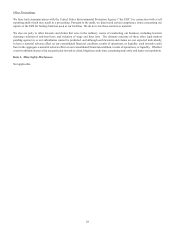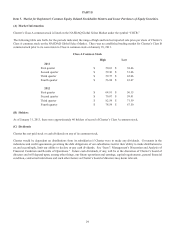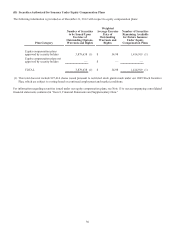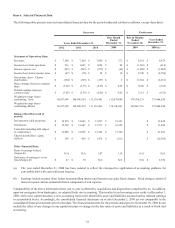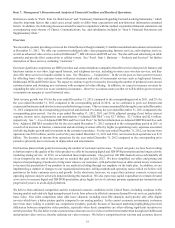Charter 2012 Annual Report Download - page 35
Download and view the complete annual report
Please find page 35 of the 2012 Charter annual report below. You can navigate through the pages in the report by either clicking on the pages listed below, or by using the keyword search tool below to find specific information within the annual report.23
If we are unable to retain key employees, our ability to manage our business could be adversely affected.
Our operational results have depended, and our future results will depend, upon the retention and continued performance of our
management team. Over the last twelve months, we have experienced significant changes in our management team and may
experience additional changes in the future. Our ability to retain and hire new key employees for management positions could be
impacted adversely by the competitive environment for management talent in the broadband communications industry. The loss
of the services of key members of management and the inability or delay in hiring new key employees could adversely affect our
ability to manage our business and our future operational and financial results.
Risks Related to Ownership Positions of Charter’s Principal Shareholders
Charter’s principal stockholders own a significant amount of Charter’s common stock, giving them influence over corporate
transactions and other matters.
Members of Charter's board of directors include directors who are also employed by our principal stockholders, Mr. Darren Glatt
is an employee of Apollo Management, L.P.; Mr. Bruce Karsh is the president of Oaktree Capital Management, L.P.; Mr. Stan
Parker is a senior partner of Apollo Global Management LLC; Mr. Edgar Lee is a Senior Vice President of Oaktree Capital
Management, L.P.; and Mr. Jeffrey Marcus is a partner of Crestview Partners, L.P. As of December 31, 2012, Apollo funds
beneficially held approximately 24% of the Class A common stock of Charter. Oaktree Opportunities Investments, L.P. and certain
affiliated funds beneficially held approximately 12% of the Class A common stock of Charter. Funds affiliated with Crestview
beneficially held approximately 10% of Charter's outstanding Class A common stock as of December 31, 2012. Charter's principal
stockholders may be able to exercise substantial influence over all matters requiring stockholder approval, including the election
of directors and approval of significant corporate action, such as mergers and other business combination transactions should these
stockholders retain a significant ownership interest in us. Charter's principal stockholders are not restricted from investing in, and
have invested in, and engaged in, other businesses involving or related to the operation of cable television systems, video
programming, Internet service, telephone or business and financial transactions conducted through broadband interactivity and
Internet services. The principal stockholders may also engage in other businesses that compete or may in the future compete with
us.
The principal stockholders' substantial influence over our management and affairs could create conflicts of interest if any of them
were faced with decisions that could have different implications for them and us.
Risks Related to Regulatory and Legislative Matters
Our business is subject to extensive governmental legislation and regulation, which could adversely affect our business.
Regulation of the cable industry has increased cable operators' operational and administrative expenses and limited their revenues.
Cable operators are subject to various laws and regulations including those covering the following:
• the provisioning and marketing of cable equipment and compatibility with new digital technologies;
• subscriber and employee privacy and data security;
• limited rate regulation of video service;
• copyright royalties for retransmitting broadcast signals;
• when a cable system must carry a particular broadcast station and when it must first obtain retransmission consent to
carry a broadcast station;
• the provision of channel capacity to unaffiliated commercial leased access programmers;
• limitations on our ability to enter into exclusive agreements with multiple dwelling unit complexes and control our inside
wiring;
• the provision of high-speed Internet service, including net neutrality rules;
• the provision of voice communications;
• cable franchise renewals and transfers; and
• equal employment opportunity, emergency alert systems, disability access, technical standards, marketing practices,
customer service, and consumer protection.
Additionally, many aspects of these laws and regulations are currently the subject of judicial proceedings and administrative or
legislative proposals. In 2010, the FCC submitted its National Broadband Plan to Congress and announced its intention to initiate
approximately 40 rulemakings addressing a host of issues related to the delivery of broadband services, including video, data,
VoIP and other services. The broad reach of these rulemakings could ultimately impact the environment in which we operate.
There are also ongoing efforts to amend or expand the federal, state, and local regulation of some of our cable systems, which




